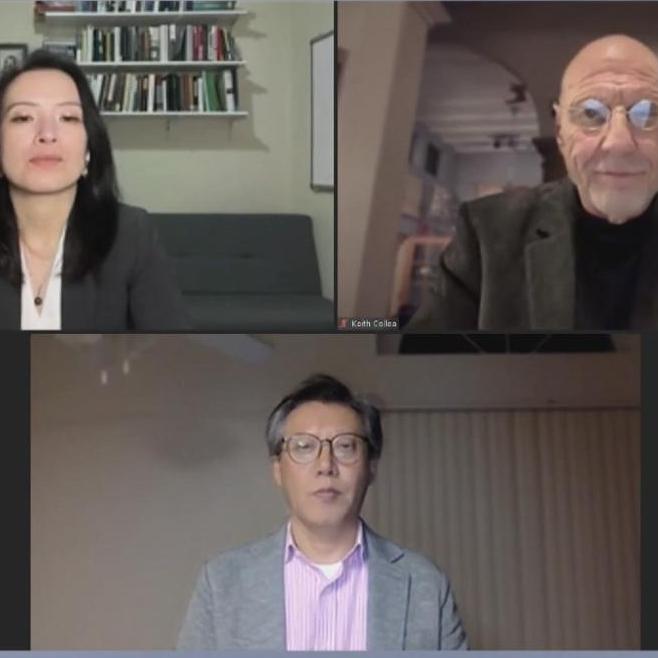Discover Dialogue
Dialogue

Dialogue
Author: China Plus
Subscribed: 26Played: 741Subscribe
Share
© Copyright @ China Plus
Description
Dialogue covers a wide range of topics, providing a balanced and critical perspective on current affairs and analysis within the framework of cross-cultural and multidisciplinary comparisons. Hundreds of heads of state, diplomats, business leaders and culture icons have appeared on the show.
846 Episodes
Reverse
In this edition, we talk about the current international landscape amid all kinds of uncertainties. How can the world seek greater understanding and cooperation?
German Chancellor Friedrich Merz will make his first trip to China since taking office. How will Beijing and Berlin manage cooperation and competition, especially in industrial manufacturing?
The year of 2026 marks the beginning of China's 15th Five Year Plan, a moment when economic planning meets a far more complex global environment. Slower global growth, rising geopolitical tensions and structural pressures at home are re-shaping how China thinks about development, reform and opening-up. What kind of economic roadmap is China setting for the next five years? How is policy adapting to weaker demand, greater competition and growing uncertainty? And where do opportunities lie for foreign investors as the country pushes for high-level opening up?
The Spring Festival is China's warmest cultural landmark, woven into the nation's DNA. Yet it is also a tradition quietly transforming before our eyes. The aroma of New Year's Eve dinner now travels through video calls. Financial blessings are sent through digital red envelopes with the tap of a finger. The roar of firecrackers has given way to dazzling but silent light shows. While the forms may be changing, do the deeper meanings remain the same? As this traditional holiday meets digital technology, green values, and global trends, is it being diluted — or is it finding new vitality?
Dialogue covers a wide range of topics, providing a balanced and critical perspective on current affairs and analysis within the framework of cross-cultural and multidisciplinary comparisons. Hundreds of heads of state, diplomats, business leaders and culture icons have appeared on the show.
Relations between the United States and Europe are facing a profound shift. At forums like the Munich Security Conference, European analysts have warned that U.S.-EU relations are becoming more unpredictable. European policy makers are openly discussing ideas once considered taboo - from a strategic autonomy in defense to re-calibrating economic and political ties. What is driving this widening gap? Is this a temporary rupture linked to the current Trump administration or a deeper shift in how Europe and the U.S. see each other? What might a new balance in the transatlantic relationship look like?
Japan's recent snap election has delivered a historic victory for Prime Minister Sanae Takaichi and her ruling Liberal Democratic Party. Together with its coalition partner, the Japan Innovation Party, the ruling bloc has secured 316 seats, more than two-thirds of the House of Representatives. This decisive result gives the government far greater leverage on security and economic policy. What drove this landslide victory? What changes might follow?
A recent ruling by Panama's Supreme Court has thrown the future of two major ports at the Panama Canal into uncertainty. The court ruled that the contract operated by a Hong Kong-based firm is unconstitutional, calling into question nearly thirty years of port operations. The decision could have far-reaching implications for foreign investors, Panama's business environment, and confidence in long-term contracts at one of the world's most important trade chokepoints.
The Jeffrey Epstein files released by the U.S. Department of Justice have raised fresh questions when crimes involve elite networks and institutional failures. What have the files revealed? Why did it take so long for the information to come out? And what consequences may follow?
With China expanding visa-free access for travelers from dozens of countries, more foreign visitors are seeing the country not just through headlines but also through daily life. Many visitors arrive with firm impressions already formed by news coverage, social media and political narratives. What happens when those expectations meet reality? What surprises them most once they're here?
As the United States and Iran prepare for talks in Turkiye, tensions are once again rising. Tehran is issuing stark warnings about regional consequences in the event of a U.S. attack, while Washington is ramping up military pressure, signaling an increasingly imminent threat. Why is the U.S. targeting Iran again at this moment? What can we expect from the upcoming talks?
In Minneapolis, two fatal shootings by U.S. Immigration and Customs Enforcement agents within weeks have sparked nationwide protests. Demonstrators are calling for accountability and questioning whether federal immigration enforcement is operating within legal bounds. These incidents raise broader questions about U.S. immigration policies and their social impact. We also explore the viral phrase "kill line," which reflects growing concerns over economic vulnerability and social risk in American society.
UK Prime Minister Keir Starmer is on a four-day visit to Beijing and Shanghai, marking the first trip to China by a British prime minister in eight years. The visit comes amid a string of recent trips to China by Western leaders, including those from Finland and Canada. Together, these renewed engagements raise broader questions about the state of the world today, and about China's expanding role within it.
After threatening tariffs over Greenland, U.S. President Donald Trump backed down after talks with NATO leaders at the Davos forum, dropping earlier hints of using force. He now claims a new framework is in the works. This comes amid a far tougher tone from the EU toward Trump's pressure tactics.What is the latest on Trump's goal for the U.S. to own Greenland? What steps is the EU prepared to take in the event of further pressure? And are we witnessing a shift in how Europe deals with Trump and the United States?
A transatlantic storm is brewing over Greenland. U.S. President Donald Trump has threatened steep tariffs on eight European countries, starting at 10 percent in February and rising to 25 percent in June, unless a deal is reached over U.S. control of the Danish territory. He has also declined to rule out the use of force, prompting sharp warnings from Copenhagen and a scramble in Europe over how to respond without escalating into a trade war or a security crisis. EU leaders are now holding urgent talks on sovereignty, deterrence, and possible economic countermeasures. What's driving the U.S. push to take Greenland? How will Greenland annexation impact relations across the Atlantic?
As Iran's domestic situation gradually stabilizes, pressure on the country from abroad is mounting. U.S. President Donald Trump has publicly voiced support for protesters and hinted at possible action against Tehran. How likely is Washington to exploit what it sees as Iran's vulnerability? In what ways might it do so? Would such moves serve U.S. objectives—whatever those may be—and how would they affect regional peace and stability?
After two weeks of unrest, Iran says the situation is now "under total control." At the same time, tens of thousands of government supporters took to the streets this week, answering official calls to show solidarity with the state. What triggered this wave of unrest in the first place? How is the Iranian government responding to mounting economic and social pressure? And amid signals from Washington about backing protesters, where might Iran–U.S. relations go from here?
South Korean President Lee Jae Myung has wrapped up his first state visit to China, marking a renewed effort to strengthen ties between Seoul and Beijing. During talks, Chinese President Xi Jinping urged Seoul to make the right strategic choices amid growing global uncertainty, while both sides pledged closer cooperation on trade, technology, transport, and regional stability. We spoke with Moon Chung-in, a senior South Korean diplomat, for more insights.
Venezuelan President Nicolas Maduro has pleaded not guilty to all charges in a U.S. federal court in New York, marking his first public appearance since being seized by U.S. forces over the weekend. At the same time, just miles away, the UN Security Council convened an emergency meeting, where dozens of countries condemned the U.S. military action against Venezuela as a violation of international law and a "crime of aggression." So what is behind the forcible seizure of a sitting head of state? What does this episode tell us about the direction of U.S. power and influence in the Western Hemisphere as we head into 2026? And what impact could it have on the global order and the international community at large?
South Korean President Lee Jae-myung is in Beijing this week on his first visit to China since taking office. Beijing and Seoul have described the trip as an opportunity to reset ties and elevate their Strategic Cooperative Partnership at a time of unprecedented global transformation. With geopolitical tensions rising, trade protectionism returning, and Washington watching closely, the stakes of this visit extend beyond bilateral symbolism. Can the two sides rebuild momentum after years of strain? What outcomes should we expect form President Lee's meetings in China? And how far can South Korea pursue strategic autonomy while balancing relations between Beijing and Washington?





